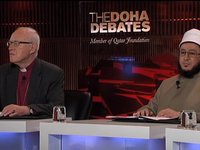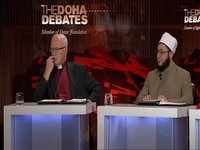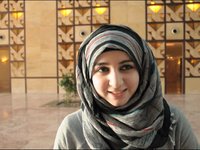This House believes Arab governments need to take urgent measures to protect religious minorities
Monday April 30 2012
MOTION PASSED
by 72% to 28%
Transcript
Order of speeches
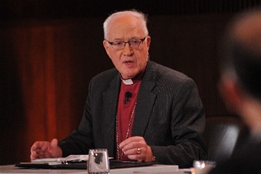
Introduction
TIM SEBASTIAN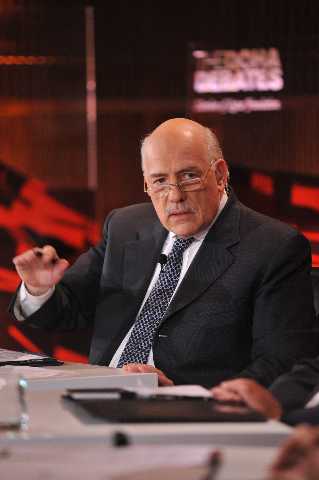
Ladies and gentlemen, a very warm welcome to the latest Doha Debate, coming to you from the Gulf State of Qatar and sponsored by the Qatar Foundation. For years now life has been getting harder and more violent for religious minorities in the Arab world. From Iraq to Egypt to Sudan, non-Muslims have been targeted and their places of worship destroyed. In March the Grand Mufti of Saudi Arabia piled on the pressure, calling for all churches in the Gulf to be destroyed - a demand that provoked outrage and dismay in many parts of the world. Our motion tonight seeks to chart a way forward: ‘This House believes Arab governments should take urgent measures to protect religious minorities.' And as usual, our panellists disagree fundamentally. Speaking for the motion: Dr. George Carey, now Lord Carey, and a former Archbishop of Canterbury, who was leader of the world's third-largest Christian community. He is now President of the London School of Theology. And with him: Ahmed Saad, former Imam of the North London Central Mosque. He led his first prayer at the age of 13 and is now founder and Chairman of the Ihsan Institute for Arabic and Islamic Studies based in the UK. Against the motion: Fadi Daou. He works with a variety of groups to promote relations between different faiths. He's also Professor at Holy Spirit University in Lebanon, a priest in the Maronite church and head of its Interreligious Relations office. Also against the motion: Roger Bismuth. He became a Senator in Tunisia in 2005, one of very few Jews ever elected to parliament in the Arab world. He's also a member of the International Council of Jewish Parliamentarians. Ladies and gentlemen, that's our panel. [Audience applause] So could I first please ask Dr. Carey - Lord Carey - to speak for the motion.
George Carey
Speaking for the motion
GEORGE CAREY
In supporting the motion, I don't mean that only Arab governments have the duty to protect religious minorities. All governments, wherever they are, have that responsibility. But since we are here in the Middle East, here in Doha, then in this region Arab governments must take the lead. And by minorities, we don't just mean Christian but there are obviously other: Muslims, Jews, Bahá'ís and others. What is the scale of the problem? Well, there are many governments, of course, that take a responsible attitude to this. Here we are in Qatar, which has a very positive policy. We can also think of Jordan. We can think of Tunisia. But there are other governments where the attitudes range from gloomy to downright awful. And the worst, I want to suggest, is Saudi Arabia, where non-Muslims cannot act worshipfully in that country. I as a Christian can't take a cross in, can't take a Bible, not allowed to worship. And there's a sense in which that is profoundly unjust, and we look for that government to change eventually. We think of Egypt, where in recent years there's been colossal attacks on property. The Coptic church, which was there for 2,000 years and now depleting 10 percent of the population in the last year, has lost 100,000 of its members. We think of the vast exodus from Iraq, which has gone from one and a half million to half a million now. We think of the Jews, which had a very strong community - now we can count their numbers in single figures. We think of Christians in Hezbollah-held territory in Lebanon, where in some places the population has moved from 75 percent to 30 percent. We think of the consequences for Palestinian Christians in Israel, Bethlehem: there are now more Palestinian Christians in Sydney, Australia than there are in Jerusalem.
TIM SEBASTIAN
If you could come to a close, please.
GEORGE CAREY
So you can see the scale of the problem. And I must finish therefore. So the importance of this for us all, ladies and gentlemen, is to see minorities not as aliens but as worthwhile communities in our countries who have a contribution to make.
TIM SEBASTIAN
Lord Carey, thank you very much indeed. It's useless to call on Arab governments to protect religious minorities, isn't it, when they don't protect majorities in their country either?
GEORGE CAREY
That's also true. But I..
TIM SEBASTIAN
So realistically how useful is your call to Arab governments?
GEORGE CAREY
Well, it is very important because where the weight falls is on the minority. The majority, of course, the majority of the population can stand firmly because they are one. When you have small minorities, they have no protection. They need the protection of the law.
TIM SEBASTIAN
They have protection when they're involved in the life of the community and the life of the majority. That's their protection, isn't it?
GEORGE CAREY
Well, I'm saying they should have that protection. But you hear their voice. I think, for example, of the Coptic voice in Egypt and they say no, they don't and they're not often allowed the right to speak up. Shaykh Ahmed might be able to say more about that as someone who knows Cairo and Egypt better than I do.
TIM SEBASTIAN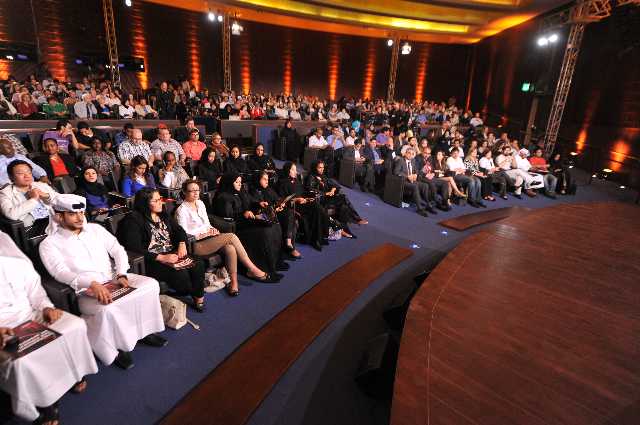
But you have had cases where Muslims have marched in sympathy with Copts in Egypt, where the Muslim Brotherhood has actually said they will protect churches...
GEORGE CAREY
Absolutely, yes.
TIM SEBASTIAN
.. so that they can't be damaged. And that is a sign of the community coming together.
GEORGE CAREY
Of course it is. Yes.
TIM SEBASTIAN
If you ask a government that is not assuring anybody's rights to assure minorities' rights, it puts them in the wrong position, doesn't it?
GEORGE CAREY
Yes, but you heard from what I said at the beginning that the minorities are not only Christian, from my perspective. We have to uphold the rights of all minorities. And minorities do stand together very often - and you've given an illustration of that.
TIM SEBASTIAN
Well, I was going to say: if there had been more concern with Muslim minorities in Europe, perhaps the Arab governments would listen more to your appeals. But we've just had Amnesty International talking about serious discrimination against Muslims in Europe.
GEORGE CAREY
Yes, yes. In fact..
TIM SEBASTIAN
How much have you spoken out about that?
GEORGE CAREY
Oh, indeed I have, because I believe very strongly in the importance in a democratic country that we must uphold the rights of all parts of the community.
TIM SEBASTIAN
But it's not doing it even in countries like Belgium and the Netherlands, which were singled out by Amnesty International.
GEORGE CAREY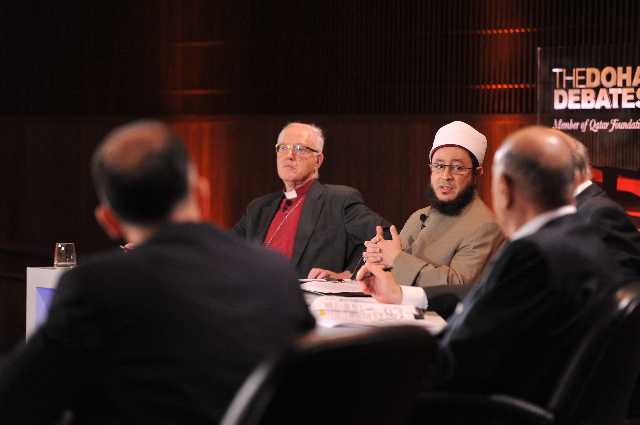
Well, I know, you're referring to a very interesting and very recent one. Amnesty International didn't point the finger at the United Kingdom, because I think we are there in a responsible way saying that everyone should have the right of protection of the government under one law. Of course, I'm not Belgian, I'm not Spanish, and it's up to them to defend their own position.
TIM SEBASTIAN
All right, Lord Carey, thank you very much indeed. Now please could I ask Fadi Daou to speak against the motion.
Fadi Daou
Speaking against the motion
FADI DAOU
Thank you. Although I can understand the concern and feeling of responsibility behind this motion, I cannot but disagree with it, at least for three major reasons. First of all, I believe that the responsibility of a government, of each government, is to guarantee security for all its citizens and on an equal basis. And instead of stigmatising the religious minorities by providing a specific protection to them, the government should face the source of the threat and danger and focus on fighting extremism and intolerance and extract it from its roots. Second, most of the Christians in the Arab world in fact refuse to be considered as minorities. And this is very important for our debate since they share with Muslims the Arab country and civilization from its origins. And this is a very important difference between them and the Muslim minorities, for example, in Europe or in Western countries. And they are co-responsible for their countries and societies. They perceive themselves, and seek to be perceived, as proactive citizens and not as minor or foreigner or marginalised communities in their own societies. And thirdly and finally, what really needs to be protected in the Arab world - I agree with you that something should be protected, but it's not to minorities - it's freedom. And freedom is a universal right, freedom of expression, freedom of conscience. So yes, of course, freedom is under threat when hegemonic groups or populist parties reach political power. In this case not only Christian minorities or Jewish minorities should be protected, but I think hegemonic groups in power are a threat for all who are different from them. And this is why protection is needed for diversity in the Arab societies and diversity including Muslims also some freethinkers or activists or any other persons different from the hegemonic group in power.
TIM SEBASTIAN
Thank you, Fadi Daou. Thank you very much indeed. You're a Maronite priest.
FADI DAOU
Yes.
TIM SEBASTIAN
A Christian from Egypt or Iraq comes to you and says: "My community has been targeted, my churches have been destroyed." You're going to say to him: "No, I'm not going to offer you any protection at all. I'm not going to go to the governments. I'm not going to say to your Arab governments, ‘You should do something to protect you'"? You're going to turn away and say: "Oh, it's part of a wider issue"?
FADI DAOU
In fact, I will tell you what I am doing, because we are very concerned by the problem.
TIM SEBASTIAN
No, no, can you answer that question: are you going to turn them away?
FADI DAOU
No. Exactly, I will ask him to collaborate with me and with other people who are Muslims in his societies to work to build a real model and fair state in their own country. Because...
TIM SEBASTIAN
Well, that's a huge comfort when people in his community are being murdered and his churches are being torn down. That's a huge comfort to him.
FADI DAOU
I can fully understand..
TIM SEBASTIAN
"Just think of the long term," you're saying to him. "Don't worry about the situation now, don't worry about murder, don't worry about destruction. Just think of the long-term better society. Dream on."
FADI DAOU
In fact we have to think on both levels, on short and long term. Because thinking...
TIM SEBASTIAN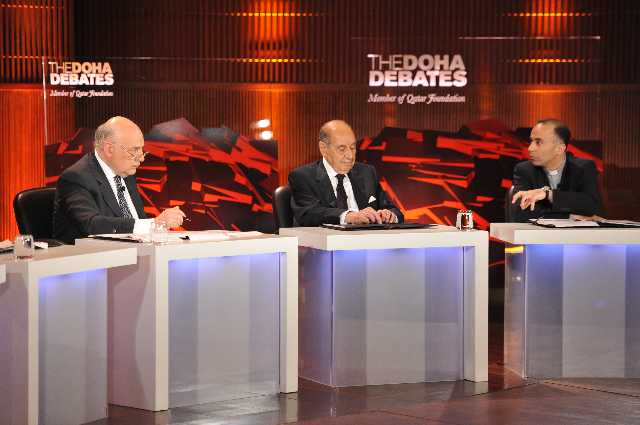
Isn't this a huge dereliction of your duty?
FADI DAOU
No. Thinking just on the short term, I think it is the best way to evacuate the Middle East from its Christians. Because it's the best way to stigmatise them as victims, and then they will seek a better life. Of course they can find..
TIM SEBASTIAN
The Middle East is losing its Christians. Look at Lebanon, look how many it's lost in Lebanon over the years. It's losing its Christians.
FADI DAOU
Of course. Of course. And I believe this is one of the reasons. Because we are stigmatising these groups as minorities, and they are..
TIM SEBASTIAN
But they're being targeted as minorities. You're not stigmatising them - they're being targeted because of their religious persuasion.
FADI DAOU
I don't believe that is true. It's a kind of stigmatise. In fact...
TIM SEBASTIAN
So it's a coincidence that churches and Christians are just - Christians are dying and churches are being pulled down? That's a coincidence, is it?
FADI DAOU
Not at all. Not a coincidence. But this is a sign of a kind of pathology that is very, very present in all the Middle East, which is extremism and violent groups that are present in the Middle East. The issue is what is behind this? Is the violence against religious minorities or against Christians just a security issue, or is this a social and cultural and religious issue? If it was just a security issue, of course we can ask governments...
TIM SEBASTIAN
To them it's an issue of safety; to you it's an intellectual argument.
FADI DAOU
Not that. Not that. It is an issue of...
TIM SEBASTIAN
We're coming to the end. I have to move on.
FADI DAOU
Yes, it's an issue of safety, but it's also an issue of living in their own societies in a free way.
TIM SEBASTIAN
Okay, Fadi Daou, thank you very much indeed. Could I now please ask Ahmed Saad to speak for the motion.
Ahmed Saad
Speaking for the motion
AHMED SAAD
Well, let me first say that I live in a minority in the UK and I don't see that as a disgraceful term or as a victimising term at all. I see that as a descriptive term of a status quo. We have to accept that there is a problem in the Arab world as much as in other parts of the world, including the West; but since we're talking about the Arab world - which has started to appear on the surface in recent years, part of which is the government not addressing that. Because many Arab governments work on the basis of aftermath security or aftermath work - they wait until a disaster happens in countries like Egypt, where I originally come from, and then they start moving. And when they start moving it is very, very late. Inflammation increased with the rise of extremist groups in the 1970s and afterwards. And the question is quite timely because many Islamist movements are coming to power nowadays, and the question is what are the rights and what are the challenges of the minorities - which again is not a disgraceful term or anything - under these movements when they come to power? There was a failure in one of the very big Islamist groups in Egypt, the Muslim Brotherhood, when they discussed can a non-Muslim hold a public post? And they failed to answer that question, and it was actually a big failure for them for their political agenda that has got a lot of echo. Aspects of this problem is, one, there is archaic codes that are still in force in places like Egypt and many Arab countries. In 1856 the Ottoman Emperor issued something called the Hamayouni Line in which he did not allow non-Muslims to build their houses of worship except with the permission from the Sultan or the Caliph himself. After the abolition of the caliphate this moved to the President. In a bureaucratic country it is impossible to get a permission from a President for a small community to build their houses of worship. When we see the Muslim majority are able to build their mosques, this creates an atmosphere of upset and depression. Media dishonesty, which works on fanning the flames of the problem; political interference from the external and foreign countries and ..
TIM SEBASTIAN
Would you come to a close, please.
AHMED SAAD
Yes. And also - and this is a very important point I want to make - that when we speak about Arab governments protecting the rights of the minorities, this should be sorted out by Arab governments; shouldn't be forced upon them.
TIM SEBASTIAN
Okay, all right. Ahmed Saad, thank you very much indeed. So you think they're going to come to this realisation that they have to do something about minorities by themselves..
AHMED SAAD
They have to.
TIM SEBASTIAN
..without any pressure? What do you mean, they have to? They haven't, for decades. What's going to make them? What are you waiting for - an act of God?
AHMED SAAD
Well, we don't have Arab governments at the moment in many countries. Let's form the governments first. Build a house and then think about furniture.
TIM SEBASTIAN
But this isn't a new problem; it isn't one that's come just in the last year. This is something that the Pope spoke about last January in Egypt.
AHMED SAAD
But people have been suffering for the past fifty years and there was no talk about minorities anyway. Everyone was suffering, so everyone was in the same boat.
TIM SEBASTIAN
But it's Christians who have been leaving - it's Christians who are leaving the Middle East in droves.
AHMED SAAD 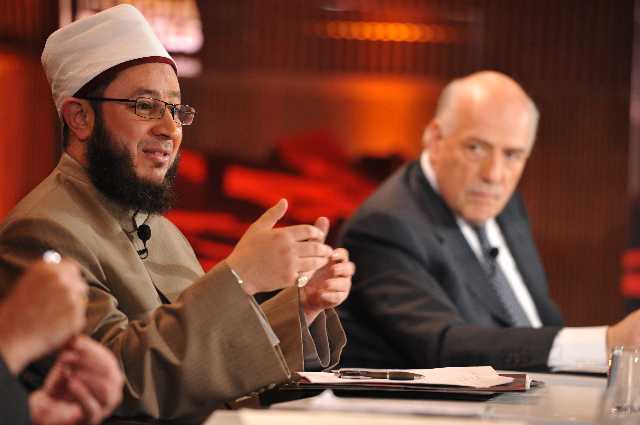
Well, no, Muslims have been leaving as well.
TIM SEBASTIAN
And the present Archbishop of Canterbury said that it was possibly the worst situation they were facing for centuries.
AHMED SAAD
No, but..
TIM SEBASTIAN
You disagree with him?
AHMED SAAD
Not that I disagree with him. So many Muslims have had to flee their countries and go as asylum-seekers and refugees because of the dictatorships in the Arab world.
TIM SEBASTIAN
You're on the side that says Arab governments should take urgent measures to protect minorities.
AHMED SAAD
Yes, we should.
TIM SEBASTIAN
What kind of protection should they offer?
AHMED SAAD
They should look into the laws that are there and try to reconcile that. And they should put - if we're talking about..
TIM SEBASTIAN
Sounds very vague: "look into the laws, reconcile this and"..
AHMED SAAD
We're building a city state.
TIM SEBASTIAN
These are concrete, urgent problems that people are facing.
AHMED SAAD
Yes. Yes. And ..
TIM SEBASTIAN
Death and destruction.
AHMED SAAD
We're looking at the laws and issuing decrees and issuing...
TIM SEBASTIAN
Sounds a bit vague. It's not much of a comfort to these people, is it?
AHMED SAAD
Well, let them get us their production, and then we can see if it's vague or not.
TIM SEBASTIAN
You don't seem to have much of a sense of urgency about this.
AHMED SAAD
No, I do. I do, and I'm saying just have the governments formed, and then they start right away. This is a very pressing issue.
TIM SEBASTIAN
Okay. Well, we're seeing governments formed in Tunisia, we're seeing governments formed in Egypt.
AHMED SAAD
No, no government formed in Egypt at the moment. Egypt is in a black tunnel now.
TIM SEBASTIAN
It is. It may be a government that is chosen by the military authorities.
AHMED SAAD
Let them come out of the tunnel.
TIM SEBASTIAN
It may be a government that's chosen by the military authorities - it's still a government.
AHMED SAAD
Well, there is no government in Egypt.
TIM SEBASTIAN
Okay, so there's nobody to talk to, so there's no Arab state to take urgent measures to protect minorities. So you're not really on that side at all, are you?
AHMED SAAD
No, I am on that side. [Laughter] I just need the people to sort their homes first and then start looking after their people.
TIM SEBASTIAN
All right. Ahmed Saad, thank you very much indeed.
AHMED SAAD
[Laughs] I just wanted to get that.
TIM SEBASTIAN
Okay, could I now please ask Roger Bismuth to speak against the motion.
Roger Bismuth
Speaking against the motion
ROGER BISMUTH
Yes, all right. As you asked before, I'll try to be very precise. I think that first of all the regimes of different countries are very important in this respect. Because we have been in Tunisia living under occupation for many years, and in '56 we became independent. And I must say, since then through Bourguiba's period and then Ben Ali's period took over, all the minorities lived quite normally - they all had the right to practise their faith and everything. But speaking about all the world, you have different countries with different regimes and they could not take the same measure. If you have a dictatorship, then it's nothing to do and talk with him, and you cannot. Many other countries now are trying to become democracies. And this must be helped, because, contrary to what was said earlier, I don't believe in real personal protection. I believe in legislation. Any country who becomes independent and tries to become a democracy must first of all.. Because I look not in the short term; I look only at the long term: I think first of all we must give a very good education to the children about this fact. Because right now the children are given a bad education. If they are told the truth, that all religions are different but they are in a way all the same. So they must give them a good education and then the state must have a very clear constitution, and the people who fail to respect the constitution must be taken to justice. That's a good point. There's no discussion about that. So to protect the people themselves, it's impossible because the minorities are not living in one place in the country; they are all over the country. How can you protect thousands of people all around the country with their factories, their offices, their homes and their children going to school and all that? It's impossible to protect. So I think it's a little useless to speak about personal protection. So only I believe in the law. That's the only thing to do.
TIM SEBASTIAN
Okay. Roger Bismuth, thank you very much indeed. You say you believe in legislation. You say you believe in education. A little while ago when a group of people appeared on the streets of Tunis and shouted, "Death to Jews"..
ROGER BISMUTH
Yes.
TIM SEBASTIAN
.. you didn't believe in legislation then. You went straight to the government and said, "You have to do something about it."
ROGER BISMUTH
No, but I put a complaint to the state.
TIM SEBASTIAN
You asked an Arab government to take urgent measures to protect the minority.
ROGER BISMUTH
Yes. Yes. Yes.
TIM SEBASTIAN
That is the motion that you are against.
ROGER BISMUTH
Yes, absolutely. [Laughter]
TIM SEBASTIAN
And you asked an Arab government to do exactly what you are against in the motion.
ROGER BISMUTH
No, no. I asked the government to take the measure according to the law.
TIM SEBASTIAN
Yes, you because you knew they wouldn't do it otherwise.
ROGER BISMUTH
Yes, they wouldn't do it otherwise.
TIM SEBASTIAN
They wouldn't do it.
ROGER BISMUTH
Because they didn't do it first time.
TIM SEBASTIAN
Yes. So you wanted to protect your minority.
ROGER BISMUTH
No, I want to protect from aggression, even verbal aggression, to people.
TIM SEBASTIAN
Yes. Yes, your minority. You wanted them protected.
ROGER BISMUTH
My minority, yes.
TIM SEBASTIAN
Yes. And you knew that it wouldn't be done through legislation, through education. So you had to go and ask an Arab government..
ROGER BISMUTH
Not ask - but force it. Force it.
TIM SEBASTIAN
.. to take urgent measures to protect a minority. You should be on the other side. [Laughter]
ROGER BISMUTH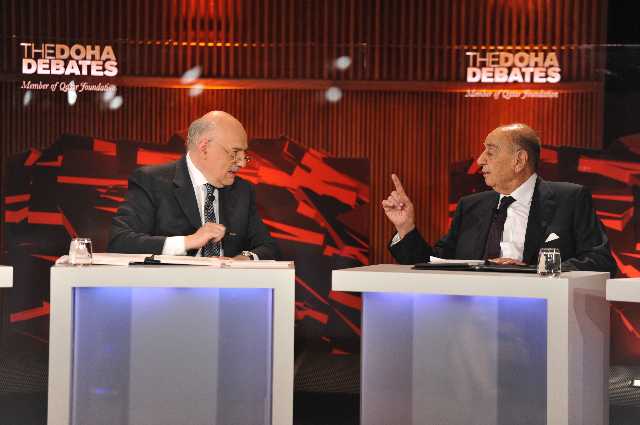
And I went to court and I put that.
TIM SEBASTIAN
I really don't know why we've got the people we have on one side as opposed to the other.
ROGER BISMUTH
No. No, no, I don't want to be protected in my own country. I'm a citizen from my country..
TIM SEBASTIAN
Well, you asked for protection for the Jews. Because if you get people getting up on the streets...
ROGER BISMUTH
No, the Jews are Tunisian citizens. They don't need..
TIM SEBASTIAN
Yes. They didn't say "Death to Tunisians"; they said "Death to Jews", didn't they?
ROGER BISMUTH
Yes. Yes.
TIM SEBASTIAN
And if you hadn't gone and intervened..
ROGER BISMUTH
Yes.
TIM SEBASTIAN
.. and they hadn't said they would arrest people, it would happen over and over again, wouldn't it.
ROGER BISMUTH
No, if it happened over, then next time somebody goes to react. I mean in the context.
TIM SEBASTIAN
Because you asked for it. Yes.
ROGER BISMUTH
Yes. So I ask only to follow..
TIM SEBASTIAN
So you took a position directly against the one that you're supporting tonight.
ROGER BISMUTH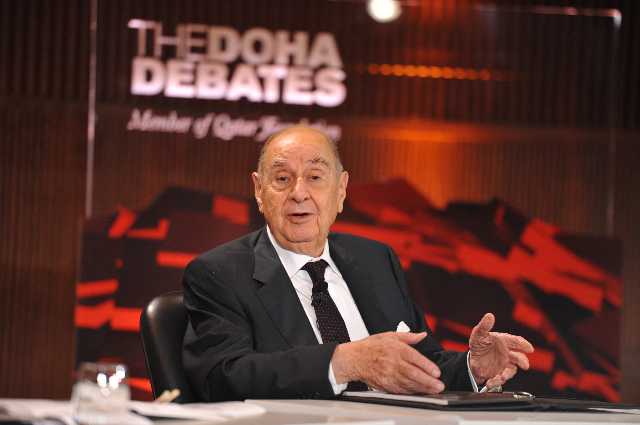
No, I didn't. I go to application, full application of the legislation, and to teach the young people when they grow up to respect all the different religions. And if anybody fails to fulfil what's written in the constitution, it would be taken to justice and judged.
TIM SEBASTIAN
All right. Roger Bismuth, thank you very much indeed. All right, I'm going to throw this open to the audience now. We are going to discuss the motion: ‘This House believes Arab governments should take urgent measures to protect religious minorities'. We'll take your questions now. There's a hand at the back, if we can get a microphone there. If you could stand up, please, we'll get a microphone to you.
Audience questions
AUDIENCE (M)
Hi there. I'm from Palestine. I have a question for Lord Carey. Sir, you mentioned at the beginning two interesting - or many interesting facts, but about two countries: for example, Iraq and also you mentioned Israel. Well, I just want to ask: because the motion is about what governments should do, but what should governments really do in situations of chaos and also external influence? If we take the case of Iraq: in Iraq we did not even hear about a church being blown up during Saddam's regime; now we hear it all the time after the American invasion. Also..
TIM SEBASTIAN
Okay, let's ask Lord Carey to answer that. Situations of chaos.
AUDIENCE (M)
Look, but just one second. Also about when he mentioned Israel I was shocked, because he considered Israel to be an Arabic country. I don't know if he also meant the Palestinian Authority, but..
TIM SEBASTIAN
Okay. You've made your point. We'll ask him to answer the question. Thank you.
GEORGE CAREY
I mentioned Israel because I was concerned with minorities. And you have a situation in Bethlehem where so many people are leaving that region and for a number of reasons. The political climate, of course, is against them - and it's not only Christians but, as Shaykh Ahmed said, Muslims are involved in this as well. So we've got to protest wherever there is injustice. I could have referred to Iran, but that's not Arab, but it's in the Middle East. So I was focusing on the issue of minorities wherever they are, that we must plead for them. And I agree with Roger Bismuth in the importance of legislation. If there's going to be reform, there's got to be democratic policies put in place where the governments are accountable to the people and where we recognise their responsibility to represent all of us, but particularly those who don't get a vote or those who are particularly marginalised.
TIM SEBASTIAN
And when you say legislation, are you talking about racial laws that outlaw racial discrimination, religious discrimination?
GEORGE CAREY
Yes, I'm thinking of ..
TIM SEBASTIAN
I mean, we have in Britain a whole raft of anti-discrimination legislation. It's not that effective, is it?
GEORGE CAREY
Yes, I know. We do certainly, and probably too many laws. But I'm thinking of generally justice for everybody; freedom. And in fact it was Professor Daou that mentioned that freedom to believe, freedom to disbelieve, freedom to change your religion - this is a fundamental article in the Declaration of Human Rights. It's freedom to build your churches or your mosques or your synagogues. It's freedom to be free and to be a person of dignity.
TIM SEBASTIAN
And is this going to be enough in the situations of chaos that exist in the Middle East at the moment?
GEORGE CAREY
It will be a start to get some of those things going, actually.
TIM SEBASTIAN
Fadi Daou, you want to say something.
FADI DAOU
Yes. I think that some of us trust, from my perspective, too much the governments in the Arab world. I trust more the Arab population than the Arab governments, in fact. And I would like not first to ask the Arab governments to protect minorities; I would like first to make them accountable of what is happening in the Arab world. Because I think we still have to build our public institutions and our legal texts and our culture also, and protecting everyone in the society, not just the religious minorities, and giving freedom and equality and fairness for everyone in the society. So I want to emphasise on this: I trust much more the population than the governments, and I would like to make them accountable. And accountability is not just about the population or about revolution or an Arab Spring; accountability is also, I think, an international responsibility. And that's why I think protecting minorities in the Arab countries is also an international responsibility. It's not just about again stigmatising these groups in their own societies.
TIM SEBASTIAN
And what about making accountable the people who are murdering and destroying churches - what about them?
FADI DAOU
Of course. I mean, but it's not enough. Not enough.
TIM SEBASTIAN
... first of all, even before the governments?
FADI DAOU
No, it's not enough. Because there are - I think there are reasons behind, there are networks behind, there are a culture behind, there are, I don't know, there are people providing arms behind. So that's why governments are accountable and are responsible for this.
TIM SEBASTIAN
All right, okay. There's a gentleman in the pink shirt up there. If you'd stand up, we'll get a microphone to you. Thank you.
AUDIENCE (M)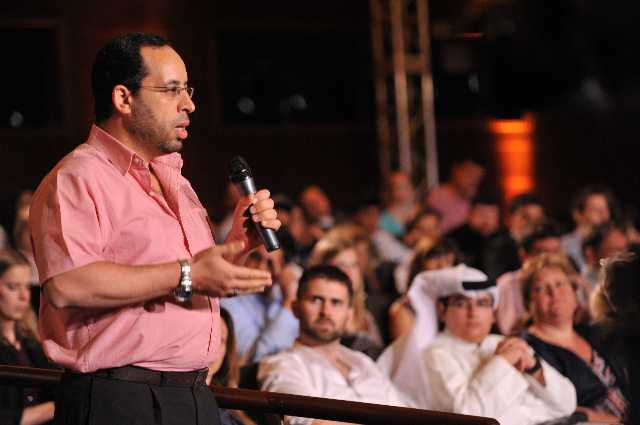
Hi, good evening. My name is Mohammed. I'm from Egypt. I'm just trying to add some shadow to this issue. I believe that the problem is more wide than just it's protecting the minorities. It's an opening a dialogue between different religions. Because if it is just about minorities, there is still minorities between Muslims to Muslims, Christians to Christians. If we start segregating the problem between the religions, we will end up like what happened in India. They pushed the Muslims out of the country; they created their own country, now Pakistan; and now we end up with a fight between India and Pakistan. There is a continuous fight now between the two countries based on religious issues. And if you talk to a Muslim country like Egypt, down in Cairo there is a Christian people coming to convince poor Muslims to go to Christianity.
TIM SEBASTIAN
Okay. Do you have a question, are you moving to a question?
AUDIENCE (M)
Yes. My question is: to get to the bottom line, how to get to the bottom line of this problem, creating minorities. How to get to the bottom line of this issue.
TIM SEBASTIAN
Ahmed Saad, do you want to have a go at that?
AUDIENCE (M)
Please. Thank you.
AHMED SAAD
Well, yes. Yes, it's quite a problematic problem. It's quite a deep problem. Well, let me just disagree with the questioner on the nature of India and Pakistan. There are more Muslims in India than in the rest of the Muslim world because in India there is about, according to non-official statistics, 300 million Muslims - which is bigger than any other Muslim country. So not all the Muslims have left India and went to Pakistan and Bangladesh. And..
TIM SEBASTIAN
Okay, all right. Yes. But back to the point.
AHMED SAAD
But the issue here is - yes - opening dialogue is quite important, because an interfaith dialogue has to be to a great extent behind closed doors and on round tables for the past few years. It has always been religious leaders speaking to each other, having some nice tea; and then their people are fighting and dictatorships and dictatorship regimes creating more tension in order to secure themselves more into power and continue in power.
TIM SEBASTIAN
Okay, but what to do about it? Basically that's the question.
AHMED SAAD
What to do about it. As I said before, we have to be honest about it. And secondly, there has to be some advisory boards from religious leaders who would give advice to the governments in order to take actual, ideal and real measures in order to solve this problem.
TIM SEBASTIAN
You really think governments are going to listen to that sort of thing, Lord Carey?
GEORGE CAREY
I think what we've got to do is to put the pressure on. Every government is very susceptible to public opinion. And if we can actually raise indignation on behalf of every minority group, then of course we can change governments. But I want to pick up a point that Professor Daou said earlier: it's not only governments, actually. Because governments have a limited responsibility. It's the power of community. If we can actually help one another with Christian and Muslim and Druze and Jews working closely together, we can change opinion and we can change the opinion of governments, because they're very nervous of what we think of and think about them particularly.
TIM SEBASTIAN
But you have to accept first of all, don't you, there's a problem of religious persecution? This is what you're dealing with.
GEORGE CAREY
Of course. Well, it may not be persecution; it could be discrimination. And we mustn't forget what Shaykh Ahmed said: that a lot of this is actually being engineered by extremist groups. They are very often manipulating the voices of the poor, of the ignorant, and so on. And a process of education has to take part in this as well.
TIM SEBASTIAN
Fadi Daou, you wanted to say something else?
FADI DAOU
Yes. I agree, but I think it's time - I mean, it's very dangerous to consider a kind of alliance among minorities in the Arab world against the Muslim majority as if the persecution is from Muslims against all the others. I mean, this is a very dangerous situation or scenario to think about...
TIM SEBASTIAN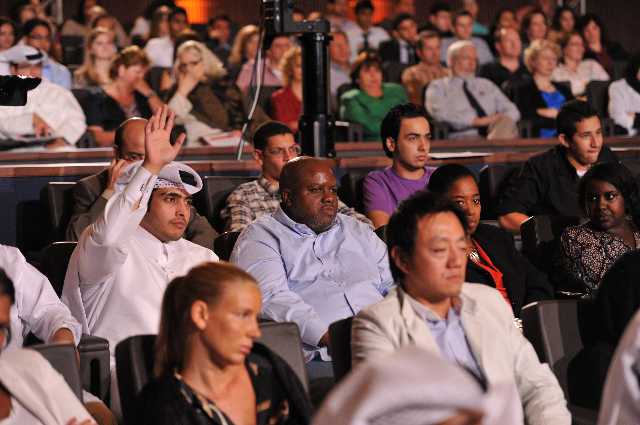
So you're saying integrate more. Your protection is in integrating more with other groups?
FADI DAOU
Of course. And not only integrating more, because Christians are totally integrated, and even sometimes more than Muslims in their own countries. But it's in ensuring more democracy, more freedom, more collaboration between Muslims and Christians to have a better situation, better public institutions. I mean, because sometimes the threat comes from the governments.
TIM SEBASTIAN
Okay. Roger Bismuth, you wanted to say something here.
ROGER BISMUTH
As it was said earlier, I think I was asked to remain focused on the Middle East, but in fact my idea goes much bigger. It's a worldwide problem. Because there are minorities worldwide - in Europe, in the United States - everywhere is a problem of minorities. But ...
TIM SEBASTIAN
Yes, but it's different. It's different in different places.
ROGER BISMUTH
No. But again I say it is why I stated on my presentation that for me the most important point is education. Because the uneducated people do not know the other one, do not know their partner in life. Because..
TIM SEBASTIAN
Educate people who want to kill and destroy?
ROGER BISMUTH
No, not to kill. Because, you know, not being a religious person, I can speak more freely. I think we should all live together. And it will take time, because this..
TIM SEBASTIAN
But the world isn't like that, is it? The world isn't like that.
ROGER BISMUTH
No. No, no, no. No, I don't take that point. Because the situation we live in now did not happen within a day or a week; it happened from many years. So to repair this actual situation, it will take a long time. But we must start by education. And when the people are educated and they know there are those religions and maybe we can more appreciate each one must follow his faith, but we can discuss it very friendlily as we have all of us been discussing today, without any problem. I personally live very well. I am President of the Jewish community. I have no Jewish friends; I have only Muslim friends, some Christian friends - I don‘t mind.
TIM SEBASTIAN
And you were very worried when someone got up and said, "Kill the Jews". You were very worried.
ROGER BISMUTH
No, I'm not - no, no. I'm not worried.
TIM SEBASTIAN
You were worried.
ROGER BISMUTH
No, I was furious. Not..
TIM SEBASTIAN
Not worried at all?
ROGER BISMUTH
No, not worried, no. Not worried. Because nobody was worried. I calmed my people and I told them, "Don't care, I will force them to apologise." And the first time when it was cried, I did not apologise because the head of the actual Muslim government telephoned me himself, ringing on my mobile, to tell me: "Excuse me, excuse us, because it was not supposed to be like that. And I'm not happy about it." So I could not the next day complain. But when it happened the second time, I went to the justice and I said: "I want justice to be given to my own minority."
TIM SEBASTIAN
Okay, all right. I think there was a lady in red who had her hand up. We'll get a microphone to you. If you could tell us where you're from?
AUDIENCE (F)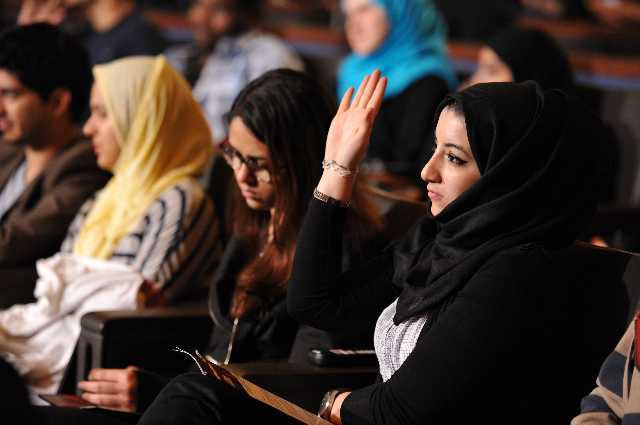
Palestinian. I think the Arab governments currently, and even before, are remnants of colonial rule. So what we are seeing is that the minorities did not exist until we had a system in which it created difference between the Muslim and the Christian and the Arab in the Arab society. So what we are having now is a part of a larger scheme of ‘divide and conquer'. So..
TIM SEBASTIAN
Okay. So what to do about it now? The colonial period's been over for quite a long time.
AUDIENCE (F)
Yeah, but we still have the elements which are the governments.
TIM SEBASTIAN
Okay, so what to do about it? What are you advocating?
AUDIENCE (F)
We need a radical change that will change the whole system of this ‘divide and conquer'. And if there is an honest government, it should be very vigilant to the outside interference in the issues of these so-called minorities in the Arab world. So France or Britain or something shouldn't be the first one to be saying "We need to protect our Christian followers." These are not their Christian followers; they are citizens of these Arab societies.
TIM SEBASTIAN
Okay. Fadi Daou, you want to say something there?
FADI DAOU
Yes, but I would like to tell our fellows that differences are real also. There are real differences in the society. The issue is not having or not this diversity within society. I believe that the solutions start by recognising this diversity; I mean, but at the same time promoting an inclusive citizenship. You mentioned the word ‘citizens' in fact, and this is very important. I believe that we cannot build our new governments or new states in the Arab world unless we promote this citizenship, but as an inclusive one recognising this diversity within societies. I mean, diversity is not a threat for a society, but when you have citizenship that includes all this diversity on an equal basis and you have a government that respects this, I think the solution will be easier than to think about the kind of monolithic situation where there is no differences and just a government..
TIM SEBASTIAN
Okay. Lord Carey, do you want to say something on this?
GEORGE CAREY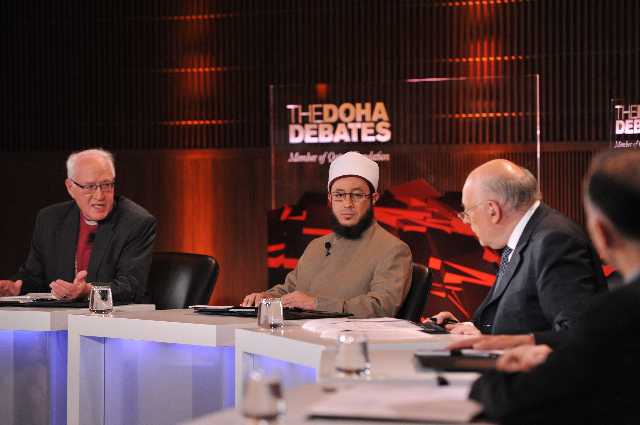
Oh, just to say that I recognise the importance of the question. We have to start with citizenship. And this is very often where the problem lies: with minorities feeling that they want to belong, they are citizens, but they're being rejected by the majority, and the government is not picking up that particular thing. So we need to protest. The world is now a global village. We know what's going on throughout the world now. And I think we do have an opportunity to see a major change. We're talking about the Arab Spring. And I think if we want this to go any further, then we're going to be looking for change in the Middle East in places such as that young lady said.
TIM SEBASTIAN
But all the reports are saying from the Arab Spring that minorities are not doing better than they were.
GEORGE CAREY
That is the worry now. We expected this to go in a different direction, but now I think it is threatened and we have to be very aware of that.
TIM SEBASTIAN
Ahmed Saad.
AHMED SAAD
Yes. Well, I had a discussion with Fadi just before we came in here, and we agreed...
TIM SEBASTIAN
Always dangerous. [Laughter]
AHMED SAAD
[Laughs] No, it is not. It wasn't. And we agreed that many Arab governments that have been formulated in the past fifty years were sponge governments, that have been just building on whatever is served to them. They wanted to create a change without any planning, without any proper planning, and with this they had a lot of dishonesty. Because of this dishonesty, this has caused a friction within their societies, as much as - yes, and that's why these Arab governments now need to sort out their problems and to sort that independently from foreign countries. They have to do that independently.
TIM SEBASTIAN
Okay. But we've got to come away with something from this debate more concrete than just that Arab governments need to sort out their problems. I mean...
AHMED SAAD
Well, we've talked about education and legislation, which are very, very important and crucial things.
TIM SEBASTIAN
Roger Bismuth, you're laughing at this.
ROGER BISMUTH
[Laughs] Yeah. I'm laughing because I told you about that this morning, and I said the problem is much wider than the Arab countries - it concerns the European countries, the American country and everybody. Because each one has a minority that doesn't behave the way it should. Because it's not only to arrest people or to condemn people; it's to educate people. Because once you get to know the people, you get to like them and to live with them as we've always done in my country. We have been living together - Christians, Jews, Muslims, whatever. We have been close to each other and we live very happily. And even when we were in Spain with the Muslims we had five centuries of fantastic life - that disappeared, unhappily.
TIM SEBASTIAN
Okay, I'm going to take a question from the gentleman in the third row, in the red shirt. Yes, you, sir. If you'd stand up, we'll get a microphone. Where are you from, please?
AUDIENCE (M)
Okay, good evening, everybody. I come from Bosnia Herzegovina, from Sarajevo, representing one organisation KULT. We are here. We are your guests. We were invited in order to share our experience and also to contribute to this discussion. Bosnia Herzegovina is like Lebanon: it's the country of majorities, when you have dominant religious communities or constitutive people, and where religious minorities are marginalised or ignored. Our context is different but religion was misused for conflict and war as well.
TIM SEBASTIAN
So what do you think about taking the issue to Arab governments and asking them to urgently protect these minorities? Is this going to work? Would this work in Bosnia, has this worked in Bosnia?
AUDIENCE (M) 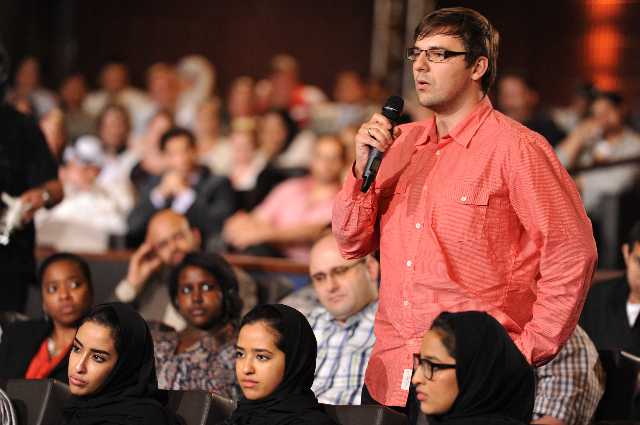
Okay. It is important to take urgent measures, of course, because, you know, there is evidently a violence on the spot, and urgent measures will help just to stop the violence. But what after that? You should think about that. First, you should think about the context: so it's not only from the perspective of the dominant religion; it's also from the perspective of the state: that should be secular. The issue of belonging is also important. So you mentioned citizenship, which is very important. All freedoms and all rights should be based upon the individual belonging. And all other peculiar characteristics of collectives should be based on this. But it's very important to establish the culture of tolerance and the culture of dialogue. This is something that we are still missing in Bosnia Herzegovina.
TIM SEBASTIAN
Why, fifteen years after the end of the Bosnian war, why are you still missing this?
AUDIENCE (M)
Fifteen years. The main guilt lies - that those who are guilty are political elites. Those are the same persons; the same faces are still in power. And also we had this factor of international community and their failures. But I think that this interreligious dialogue should be based on various levels: not only religious leaders should be those who should talk with each other, meet on conference but ordinary people, citizens of different and various backgrounds, in terms of religion as well.
TIM SEBASTIAN
But you have failed to end the hatreds, you have failed to end the feuds in Bosnia. What can the Middle East learn from the things that have not worked in Bosnia?
AUDIENCE (M)
Yes, this is a good lesson as well, you know. You can look and learn from some mistakes as well, you know. Currently we are not having this kind of violence, but we are having..
TIM SEBASTIAN
Well, you have an army, a foreign army still based on your soil.
AUDIENCE (M)
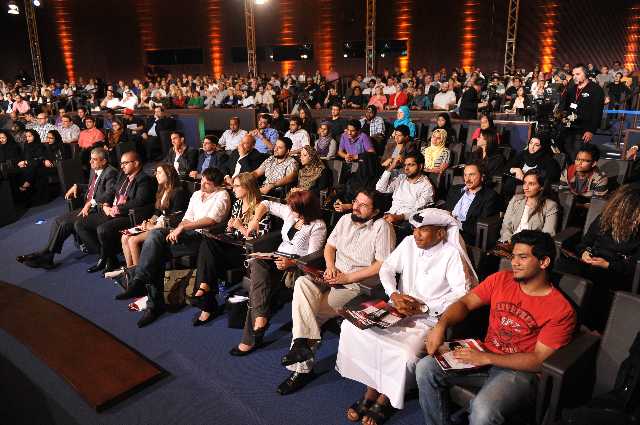
Not foreign. We have a domestic army, but we have a higher representative which is kind of an instrument of the European Union. But what is important to understand is that we have some sort of political community which is important, but we are still having this culture of community; it's not a culture of individuals. That's the biggest obstacle for Bosnia Herzegovina.
TIM SEBASTIAN
And no proper integration?
AUDIENCE (M)
No proper integration as well, yes.
TIM SEBASTIAN
Lord Carey, do you think there are any mistakes that have been made in Bosnia that we can learn from in the Middle East?
GEORGE CAREY
Yes, I was there in Bosnia in the really bad days when my wife and I went when there was still the war going on. As I understand it now, there is a process of democratisation going on in Bosnia and places like that. And if you wanted some practical comments on where we go from this, there's got to be a movement towards democracy in these countries. It was Winston Churchill who once said that "democracy is the worst form of government except for all the rest". And it is a marvellous saying because it really is saying that democracy is not perfect but what it does do is it franchises everybody. It brings us all into the role of citizen to make changes. That's got to be part of the process.
TIM SEBASTIAN
All right, okay. Roger Bismuth, you want to come in here.
ROGER BISMUTH
Yes, I just want to go back to one word that this our friend by me has said. Because we must not forget one main point that we did not discuss about. Because all this situation comes also from people, from men. Because do not forget that if men are religious, military, civilian, everybody thinks in ways of his own interests and his own.. Everybody wants to become a leader. So they don't mind creating a problem for all the people, as long as they succeed in their objective.
TIM SEBASTIAN
Okay. Fadi Daou briefly.
FADI DAOU

I want to come back to the Bosnian example. And I think there is a great lesson to be taken from this example. And the lesson is that violence cannot be faced only and violent groups on the security level, but there is also the ideological level or the cultural level that is so important also. And if we want to ask Arab governments to protect minorities, I was saying from the beginning it's not about only a security issue. It's, for example, asking a Christian Copt in Egypt to become, for example, the Minister of Interior or Minister of Security. In this way you will introduce minority as a driving force for democracy in a country. And because the word ‘identity' was mentioned, in fact, as long as and as far as people will feel that they are in a country where their identity is being hijacked or excluded from the public sphere, they will think that..
TIM SEBASTIAN
Ahmed Saad is shaking his head here. You don't agree with him.
AHMED SAAD
Because we're talking about urgent measures, and the government has its role in legislation and in doing urgent measures. Obviously education is a long-term process where people and communities and making communities aware is going to take time. But now we're talking about urgent measures, and no one can take urgent measures except governments for the time being. While we're not saying that communities will not take these measures and not meet and talk, but that is going to happen on a long term.
TIM SEBASTIAN
Okay. I'm going to take a question from the lady in the third row there. We'll get a microphone. Thank you.
AUDIENCE (F)
Hello. Actually, I'm..
TIM SEBASTIAN
Where are you from?
AUDIENCE (F)
I'm from Tunisia. Actually, I'm very concerned about the word ‘minority', because I think - I mean, a society is about what country you belong to, and the religion is a question of choice. I mean, if I choose to be Muslim and my friend chooses to be Christian, then it's her choice or my choice. However, don't you think it's a question of democracy and freedom of choice and not a question of protecting those minorities? And actually why do we call them ‘minorities' in the first place?
TIM SEBASTIAN
Lord Carey?
GEORGE CAREY
Well, there are aspects of that with which I thoroughly agree. I think what we have to bear in mind, we're all minorities in some degree or another. But when we talk about religious minorities, there are very substantial ideas and ideologies behind that. I can't simply change my mind because of the difficulties I might be encountering in my country. I'm committed as a Christian, you're committed as a Muslim, and therefore you follow that commitment through, don't you. So it's actually supporting one another. Professor Daou used the word ‘diversity' - that's what we want in our culture, is a firming and honouring diversity, allowing it to flourish and grow and make the world a better place.
AUDIENCE (F)
But don't you think, like if you have Christian Tunisian and Muslim Tunisian, don't they all fall under the same law and the same legislation?
GEORGE CAREY
Of course they do. Yes.
AUDIENCE (F)
So we create another law for, let's say, Muslims or another law for Christians? Or shall we create, you know, an all-in-one legislation for everyone and that's where we go..
TIM SEBASTIAN
Ahmed Saad. Let me bring in Ahmed Saad here.
AHMED SAAD
Yes, well, you're using the two terms as if they are opposite to each other. You're a female, you're probably a student and you're Tunisian, and there is no problem with that at all. You can be a mother and a wife and a teacher, and there is no problem with that at all. So it is a descriptive term, not a derogatory term. That's quite important to understand. And at the same time you have your rights as a Tunisian and you have your rights as a Muslim and you have your rights as a Jew and you have your rights as a Christian, and at the same time these rights should not overlap. Sometimes they overlap. But we all of us live with identity that has got simple articles in it, and this is a collective identity. You don't cross out one of the points of your identity, otherwise it will be a misinformed identity and there will be an identity crisis.
AUDIENCE (F)
Actually, I'm not talking about crossing out any identity; I'm just saying that it's a problem of choice, I mean a freedom of choice and democracy and not a problem of minorities.
AHMED SAAD
Well, at the end of the day the issue - again, the issue of minority: each one of us - let's call it ‘community', then. But it is normally the nature of the normal default situation is that the bigger normally attacks the smaller.
TIM SEBASTIAN
Okay. All right. I'm going to move on to a question from the gentleman there in the centre. You in the third row. Yes, you.
AUDIENCE (M)
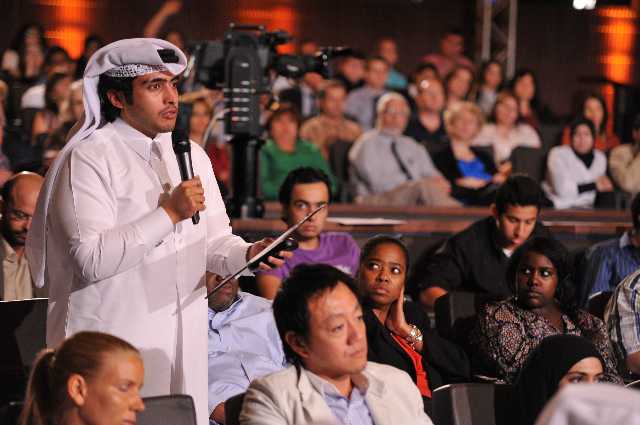
Hi, I'm from Qatar, and I have a question for both sides of the panel. Protecting minorities from whom, exactly? And if they are governments, what makes them special? And to the other side of the motion: both of you come probably from privileged minorities where you have disproportionate rights compared to the others. Many people had to protest a lot in Tunisia before they could get the government to hear them, but apparently they only needed one person to speak for the Jews when someone was attacking the Jews. And Lebanon is the same: although there is an exodus, a lot of exodus from Lebanon disproportionately from minorities..
TIM SEBASTIAN
Okay, let's take the first question you said.
AUDIENCE (M)
.. but they do have a different socio-economic background which seems privileged.
TIM SEBASTIAN
Okay. Lord Carey, protecting from whom?
GEORGE CAREY
I'm not sure of the question. Could you repeat that?
TIM SEBASTIAN
It was who are you being protected from - who do you want minorities protected from?
GEORGE CAREY
Sometimes from themselves. [Laughter] But I think we have to bear in mind actually, yes, I mean, sometimes from themselves. And maybe we all of us has got this: we believe that "my rights are more important than others'." So that's why we need an even playing field on which justice prevails. We can look at ourselves. But very often, you know, religion is part of the problem. And it's when religion and politics get muddled up, where religion shapes politics and then depersonalises other people - ‘de-citizens' them, if there is such a word as that - then we're in trouble, really.
TIM SEBASTIAN
You seem to be speaking against your place in the House of Lords. [Laughter]
GEORGE CAREY
No, no. No, it's a different argument, Tim. You'd have to have a debate on that.
TIM SEBASTIAN
You don't want to give up your seat in the House of Lords?
GEORGE CAREY 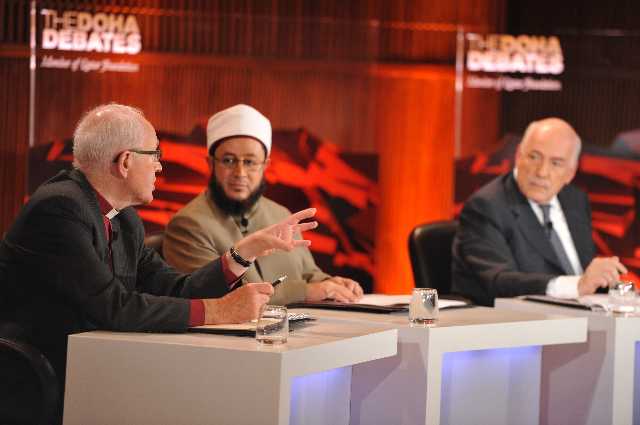
Well, the importance is that we don't allow religion to dominate to such a degree that it's "my interpretation of religion that should prevail" and we create laws only for ourselves. And that really is a very dangerous thing.
TIM SEBASTIAN
Minorities, disproportionate rights - I think that was your question. Do you have disproportionate rights, Roger Bismuth?
ROGER BISMUTH
No. Again, this is something I'm against again. I don't want to become an important person in the government because of a quota of my population, no. If I'm a very person able to help my country - that I've lived all my life, by the way - and I see the way that I think, I always think as a Tunisian and my country, and I do help my country. I never think about being Jewish or not Jewish.
TIM SEBASTIAN
Except the other day. [Laughter] Fadi Daou..
FADI DAOU
Yes, to answer the question, I think that all minorities in all the world, it's a social fact and societal fact, are more active sometimes than majorities because they have to prove themselves, as sometimes they are more active economically or culturally or so on. But it does not apply to Lebanon. In Lebanon there is no majority and no minority - in fact, everyone is a minority in Lebanon and the situation is totally different. But about the kind of disproportionate privileges or part of the political power, I don't think this is the main issue. And I'm not totally with or against the situation. I think what is more important in Lebanon is to learn how to live together again after a situation of a big conflict and a civil war in Lebanon. The situation is how we can build living together among different minorities or different communities.
TIM SEBASTIAN
Okay. All right, I think we covered that. You wanted to make just one quick point there.
AHMED SAAD
Yes, it's very brief. Sometimes we protect people to ensure neutrality. So protecting not necessarily from a danger but to ensure neutrality. What is special about the government is they have taken the responsibility, they have adopted the responsibility by running for elections, by putting their names forward, so they have to ensure that people have their quotas or their rights delivered to them.
TIM SEBASTIAN
Okay. I'm going to take a question from the lady right at the end there. Yes, you.
AUDIENCE (F)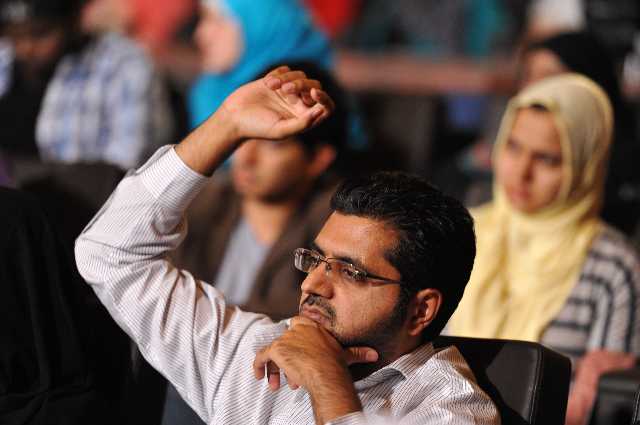
My question is: in the earlier part of the past century, the coexistence of religious minorities in the Arab world, there were some very positive examples. I'm originally from Libya, and there was a very small population of Jews in Libya that used to live side by side. They had their place of worship. They were protected. There was no - I don't believe there was any negative actions against them in the earlier part of the century. This community was unfortunately asked to leave Libya due to the past regime. So I'm asking this side of the panel what..
TIM SEBASTIAN
This side?
AUDIENCE (F)
Yes. I'm asking them what lessons can we take from these past Arab governments, that we can suggest to these new Arab governments to protect these religious minorities?
TIM SEBASTIAN
Lord Carey.
GEORGE CAREY
I'm very interested in Shaykh Ahmed's view on this..
TIM SEBASTIAN
We'll come to it in one second.
GEORGE CAREY
.. but I do believe that it is terribly important to take these good examples. And you gave a wonderful one. Because I've heard quite recently, twelve months ago, when a Coptic church was being ransacked, and it was a number of Muslims who came with the Christians and surrounded the church and protected it. So if you're looking for that kind of thing, I think that is something we want other people to do, and encourage to be on the side of minorities when they are threatened.
AUDIENCE (F)
In terms of governments, like I don't have a very strong historical background, but what were the Arab governments doing back then that was obviously right that, you know, gave these people, these religious minorities, the freedom to practise a religion and not be..?
TIM SEBASTIAN
Ahmed Saad, do you want to take that?
AHMED SAAD
I believe - and this is my opinion here - is dictatorships in the Arab world, recent dictatorships have marginalised authority of religious institutions - places like al-Azhar and these well-established scholarships. And that has given a space for a more extremist address that has started to make more tension and also has started to..
TIM SEBASTIAN
But what lessons to draw from the Libyan experience, where the Jews flourished under a dictatorship?
AHMED SAAD
No, they didn't flourish.
AUDIENCE (F)
They didn't flourish under the dictatorship; they flourished under the kingdom, the previous kingdom. But they were actually persecuted during Gaddafi's regime and asked to leave Libya.
GEORGE CAREY
Going further back - can I come in on that again? Because I now see where you're coming from on this. And I think that certainly history has shown us that minority Christian groups have lived with safety in Muslim-dominated countries - Egypt and so on. There's been a very benign relationship and Christianity's been respected and allowed to be at peace. But that's changed. And in a way that situation was not perfect, because Christians were seen as second-class, as dhimmi in terms of their position in society, with not sufficient freedom to build churches and so on. So we can look back and take some comfort from the example, but we want to move on. We're living in a different world.
TIM SEBASTIAN
Okay. Briefly.
FADI DAOU
Just one more to say is that, if we take the example of Syria nowadays, I think it's also dangerous to put people in front of this alternative of stability or freedom and look to the past as a stability period where communities were flourishing. I think it's dangerous probably. Times have changed, and we have to look for new solutions for the situation. And I think the role of the religious communities and religious discourse is growing now. Because in the previous time, I think one of the problems is the failure of religious institutions and religious discourse of promoting solidarity among a society and promoting the kind of interfaith, I would say, solidarity.
TIM SEBASTIAN
Okay. The lady in the second row.
AUDIENCE (F)
Thank you. I have a problem with the timing of the motion. I think you're asking the Arab governments to hand out the dessert before the kitchen's..
TIM SEBASTIAN
Where are you from, sorry?
AUDIENCE (F) 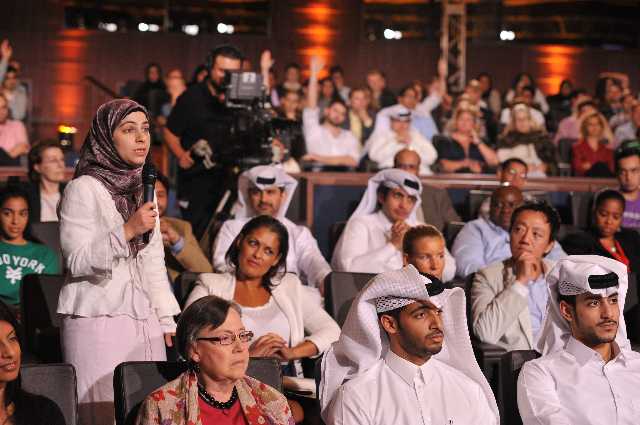
British. I'm from Britain. You're asking the Arab governments to hand out the dessert before the kitchen's been built. There's a problem of justice in the Middle East. Justice has been absent for the past thirty years. So Christians, Jews, Copts - they're all human beings first and foremost. And governments have a human responsibility. If they can establish that first, then we can look. And not to marginalise the importance of the Christian - if you wish to call them minorities - or the Jewish, the non-believers, the atheists: all those groups matter. But if we can reach out to their humanity, which has been absent for so long, then we will find that legislation will actually fall into place. That is my point.
TIM SEBASTIAN
And how do you do that? Any suggestions on how to do that?
AHMED SAAD
Well, I can agree with that in a sense, but also I would say that it is timely, because it is important in this sphere of formation to remind them not to fall into the mistakes of the past.
ROGER BISMUTH
Yeah. And may I disagree with the choice of the ‘dessert' only. [Laughter] Security is not a dessert.
TIM SEBASTIAN
Okay. Roger Bismuth.
ROGER BISMUTH
Yes, I would like to raise a problem that I'm very astonished that nobody raised the problem. A major problem we are living with in Tunisia, very interesting, is the minority of the women. Because during our independence Bourguiba gave the women full rights for everything - they are equal to the men in every respect. And now they are afraid because the new religious government has a tendency to go back to old times when the woman had not any rights and she belonged to her husband, period. So, you know, we have been through a revolution - that is not finished yet. But I believe in Tunisia the women are going to make us win the revolution, because they are fighting very strongly for their rights, and they are very active, and they operate with more courage than any man in the country. [Applause]
TIM SEBASTIAN
Okay. There's a lady in the second row, in the niqāb. Yes, you, if you'd stand up, please.
AUDIENCE (F)
I am an American Muslim myself. I'm a minority, so I can very much relate to what the House is debating right now. And I do support the motion that the governments should protect the religious minorities. Because I thoroughly enjoy my rights as a religious minority when the government was - or still is, supposedly - protecting the religious minority. And we can see very much what happens when the governments start changing or their views start changing towards the minority.
TIM SEBASTIAN
Fadi Daou, what would you say to make her change her mind? [Laughter]
FADI DAOU
Yes, I think - I mean, every population that feels that it is threatened in her human dignity, wherever it is, the situation should be taken into consideration. I mean, but we cannot compare so easily western situation - for example, American situation, European and Arab situation. I mean, at least when you have religious freedoms in a country, guaranteed in that situation..
ROGER BISMUTH
The women in Tunisia have had the right to vote before the Americans and before the French.
FADI DAOU
Yes, but we are talking about now, about nowadays, yes. So it's different, I think. The issue is the same; the contexts are very important for ...
TIM SEBASTIAN
And for Ahmed Saad's point that people get elected to government because they want the responsibility. They want the responsibility, so fulfil that responsibility.
FADI DAOU
Yeah, this is why they will become accountable.
TIM SEBASTIAN
Yes. So this is the speaker's point.
AUDIENCE (F) 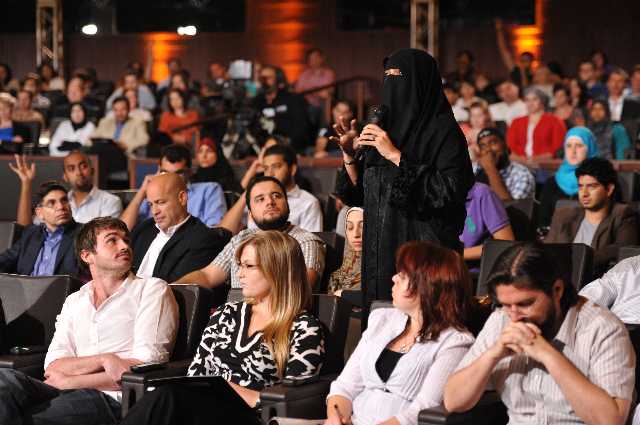
I mean, you want to educate people, which is a very good idea, but at the same time why can't it happen while the government is supporting that education about the minority.
FADI DAOU
I'm not sure I get your point, the last one?
AUDIENCE (F)
The idea of educating people, about the minority: you know, it's an excellent idea. This is what we as activists are trying do to in US. But, obviously, why it makes a huge difference is the government is also supporting that education. It's trying to build the tolerance. So in the end we do need the government's support.
FADI DAOU
I totally agree with you. I mean, I'm the head of an organisation - we fight for five years in Lebanon to convince the Minister of Education to reform the educational programme, and finally we got it, to make it more inclusive and more open to the diversity in the country. So I totally agree with you: we have to implicate governments in this battle. But they are not the only actor in the battle. I still believe in the importance of civil society also.
TIM SEBASTIAN
But they are one of the major actors?
FADI DAOU
Of course. But with a civil society.
TIM SEBASTIAN
So you're moving slowly towards that side, aren't you, [Laughter] that the government needs to take urgent measures.
FADI DAOU
No. There are important nuances in this debate here.
TIM SEBASTIAN
You're tiptoeing slightly. Okay, all right. We'll take a question from the gentleman in the middle there.
AUDIENCE (M)
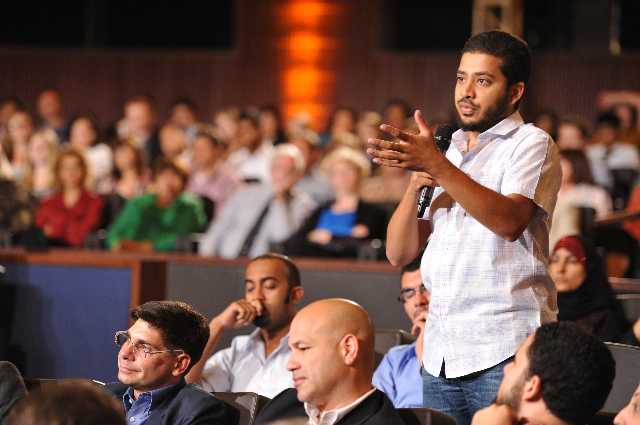
I'm from South Africa. My question is to Imam Ahmed. Just a few moments you said that it was when the dictatorships took power away from the centre of learning or religious al-Azhar which is when minorities were persecuted. But a minority which is being persecuted across the Muslim world is the Shia community, which is being largely persecuted by Sunni Muslims. So just some comment on that.
AHMED SAAD
Yes, well, and that's a very interesting point, because me and Lord Carey were talking about that this morning. I believe that religious minorities at the moment don't imply Jews, Christians, Bahá'ís only or people other than non-Muslims, but it includes Shias in a Sunni-majority country, Sunnis in Iran; and it includes also people like Sufis in Saudi Arabia, who are not allowed to build their own schools and to come up with their own views only because of a Wahabi or some one interpretation. What I said is the governments have politicised religious institutions in order to separate them from the masses, and then the masses lost interest in them and lost trust in them, and that is when they started to turn to some other authorities to get their religious food. And when they got this religious food from non-qualified authorities, because the qualified authorities have been politicised and they have been separated from the reality, the dangers started to appear to the surface.
TIM SEBASTIAN (to questioner)
Sir, did you want to come back on that? Please stand up, yeah.
AUDIENCE (M)
Yes. I understand your point, but I think that the idea that religious authority which educated or showed people the way forward, because people don't have their leadership now, they're resorting to violence or to attacking people they disagree with..
AHMED SAAD
Though they also resorted to other people to hear from - people who were not qualified. And then they started to formulate their minds.
AUDIENCE (M)
No, it is not this idea that beliefs need to come from somebody who is qualified; it's the same thing: who decides, who tells Muslims or who tells Jews or who tells the Sunni or the Shia how to behave? It's a matter of not just interfaith respect for beliefs.
AHMED SAAD
Well, it's not beliefs come from authority, but it is education that comes from someone who has got experience before you.
TIM SEBASTIAN
Okay, I think we're moving a little far away from the subject. Gentleman in the first row there, in the red shirt.
AUDIENCE (M)
Hi, I'm from India. I am also a part of this group called a religious minority in my own country. And if the law didn't protect us, we would have been in a worse-off situation than we are now. So my question is towards those who are against the motion, who say that you can do with education or you can improve education. In your speech you also mentioned that these countries are moving towards democracies: that brings us to the threat of tyranny of the majority. If the parliament or if the Muslim-majority parliament in Tunisia agrees on something which may hinder the Jewish belief or something, would you be still with that?
TIM SEBASTIAN
Roger Bismuth.
ROGER BISMUTH
Yes. Definitely, yes. Well, Tunisia has been a special case, thanks to our first president. Because he was a very open-minded man. And he started from the first day...
TIM SEBASTIAN
Yes, but what about now? We're talking about the situation now.
ROGER BISMUTH
Now. No, you see, for us the situation was all right until these people have been screaming "Kill the Jews" and so on. I mean, we are living normally. People are going to the synagogues. And we don't have any major problem now. And we have a pilgrimage coming next week, and the government insists that many Jews from Europe come to celebrate the pilgrimage in Djerba.
TIM SEBASTIAN
Fadi Daou.
FADI DAOU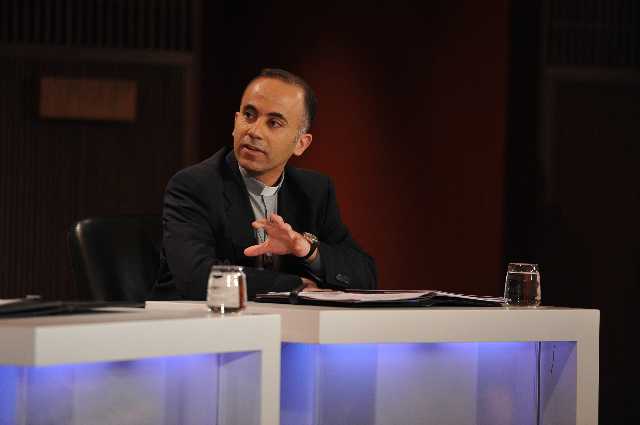
Yeah. I think that in addition to education, which is a long-term perspective, I think a minority should refuse to be stigmatised as this and build a solidarity with other people from the majority who are with that, and make a proactive advocacy within the society. I think the Arab Spring brought something wonderful for all the world, which is accountability of the responsible. But the most important issue is to make them accountable together. I think the revolution in Egypt succeeded and Tahrir Square succeeded because there were Muslims and Christians together making the government accountable.
TIM SEBASTIAN
Okay, I want to go back to the questioner on that.
ROGER BISMUTH
And on the top of what he's saying, I must say, well, this incident that happened in Tunis. I think what was written on Facebook for weeks, thousands of people, Muslim people have been writing against the government and support for the people.
TIM SEBASTIAN
Okay, I want to go back to the questioner.
AUDIENCE (M)
That's from a societal point of view. But we are talking about a government which has a religious orientation, I mean, in public. So aren't these minorities or religious minorities afraid of this tyranny of majority?
FADI DAOU
Yes, of course, but in this case the battle will still - I mean, it's a long way to take. When you talk about a state having a religious identity as a state, yes, it's a long.. But here also I think the international community is accountable. I was arguing with a French diplomat, telling him that because he was telling us in Brussels in a very public and important event that if women wear the veil in France, this is anti-democratic attitude, but if we have the Sharia law as fundamental law in an Arab country this is very democratic.
TIM SEBASTIAN
Okay. You raised the question of the tyranny of majority. Lord Carey, do you want to just address that?
GEORGE CAREY
All right. Well, just quickly, I think that's a wonderful question. Because democracy is a blunt instrument. It's not perfect. And therefore inevitably that's what we've got. In a democratic society the majority lay down the law. But in a truly democratic society it should know how to deal with minorities and should also give room for diversity in diverse ways.
TIM SEBASTIAN
It can also kick out a government, can't it?
GEORGE CAREY
They can do that.
TIM SEBASTIAN
The ‘tyranny' is temporary.
GEORGE CAREY
Yes, absolutely. Their time will come. And I won't say any more about our government.
TIM SEBASTIAN
Okay. Gentleman in the first row there. Could you stand up, please, and we'll get the microphone to you.
AUDIENCE (M)
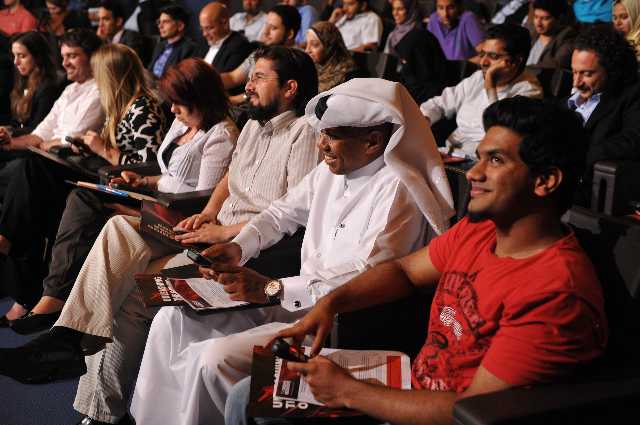
Yes, I'm from Jordan. My question is for Professor Fadi. Protecting the minorities is a duty of the government, as protecting all citizens. Making specific laws or going through legislations, as I have to agree with Shaykh Ahmed, makes them a separate part of the unity. I come from a country where Muslims and Christians live in harmony together. Now we have to debate the topic that's happening now, not what happened before. The Christians of Iraq that left, or other - even Shiite and Sunni minorities in other countries - what should we do now to preserve them and promote harmony? Living with each other no matter what - Jews, Muslims or Christians - we're living under the same roof, under the same country. We are citizens. I'm a citizen of Jordan, but I'm also an Arab.
TIM SEBASTIAN
Fadi Daou, you want to let the government off the hook, don't you?
FADI DAOU
No, I mean, security is a must. I mean, of course, first of all we have to look for security of the people. But it's not enough. It's not enough.
TIM SEBASTIAN
And it's the government that has to provide it? It's the government that has to provide it?
FADI DAOU
Yes, of course. But it's not enough. I mean, it's not enough. Because what concerns me is not when there is an attack against a Shiite community or a Christian community in a country - it is a concern, a huge concern, and we have to provide security to these people - but what concerns me more is when there this kind of attack and a part of the population is glad for this attack. This is much more dangerous, you know.
TIM SEBASTIAN
Do you want to come back on that?
AUDIENCE (M)
No one should be glad that someone is attacked.
FADI DAOU
Yeah. But this is a fact. I mean..
AUDIENCE (M)
No. Shaykh Ahmed is a minority in England but, again, it doesn't mean that his rights are being taken away just because he's a minority. Minorities and majorities, they are citizens of one country. It's not a minority of 51 to 49. Minorities should live with the majorities, and the majorities should accept the minorities no matter what. No matter. I'm not talking about specific religion or a specific sect. The citizens should live in harmony together. We're talking now about people now who left their countries now to go and live somewhere else where they're acceptable. They're not acceptable in their own country.
TIM SEBASTIAN
Okay, let him answer that.
FADI DAOU
Yeah, this is why I totally agree with you. And as it was said before, I mean, it's not just about the law of majority. I mean, democracy is also a culture - a culture of fairness, a culture of dignity, a culture of respect, of respect of diversity, I mean. And this is, I think, what is lacking in Arab countries.
TIM SEBASTIAN
Ahmed Saad, what do you..? As the questioner pointed out, you're part of a minority in England. What do you think protects your rights in England?
AHMED SAAD
Well, let me mention something. After the bombings of 7/7, there was a lot of reason to be fearful for the Muslim community in the UK. The first people we had to resort to protect the mosques was the government. Yes, we spoke to other faith groups and other interfaith communities that came and liaised with us, and we informed the public opinion, but it was the government that sent the police to protect the mosques. In cases where we have harassment or we have some hate letters, we resort to the government. So the government needs to take some urgent measures in order to sort out its house inside.
TIM SEBASTIAN
Okay. Lady in blue, we're going to take a question from you. Second row. Could you stand up, please.
AUDIENCE (F)
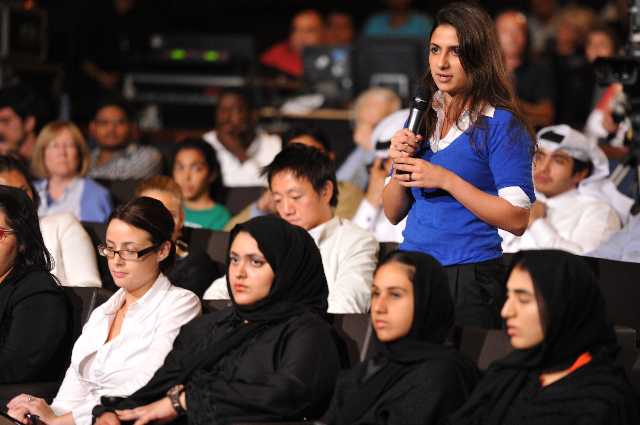
I'm Egyptian. My question is for the whole panel. I just want to ask a question specifically about Syria, which is a country where protection of religious minorities was so extensive that it was actually exploited to have a minority authoritarian regime oppressing the majority. So my question is what steps do you think should be taken to protect religious minorities in countries like Syria, or what should have been taken in countries like Iraq after Saddam Hussein was toppled, where in a post-revolutionary context they're likely to be seen as regime collaborators and targeted accordingly? Thank you.
TIM SEBASTIAN
Lord Carey, do you want to start that one?
GEORGE CAREY
Well, I think the first thing we must do, those of us who believe in the importance of prayer, is to pray for Syria. I'm against an invasion, a foreign invasion. We've seen how these things go badly wrong. I think we've got to hope that Kofi Annan's initiative will bring some fruit from that examination.
TIM SEBASTIAN
Not looking good, is it?
GEORGE CAREY
I haven't got a great deal of confidence in that, Tim. So we're left in a no-man's-land at the moment. We don't know where it's going to go. So if invasion is out, we've got...
TIM SEBASTIAN
Ahmed Saad, let me move to you.
AHMED SAAD
Well, I believe democracy should secure something like that. Democracy and honesty. Because these governments, as we - the Syrian regime was formed in a very dark time where no one knows how did it come to power.
TIM SEBASTIAN
Roger Bismuth, you'd agree with that, wouldn't you?
ROGER BISMUTH
But I always ask myself a question: do the minorities really do something to show up themselves? Most of the time they don't. You see, for example, now the first time we have in Tunisia an Islamist government. I went to the government to talk with him, to fight with him, and we became friends. I don't know that I will succeed to make him change direction, but you have to go and you have to join forces. And if you say, "I'm a victim," you get nowhere. You cannot be a victim all your life.
TIM SEBASTIAN
Okay. Fadi Daou, briefly.
FADI DAOU
I'm very concerned by the Syrian situation, and I'm very afraid also because I don't see that we are going through a good solution until now. I think the only thing we can do now, and we are trying to do, is to open any kind of mediation and dialogue between the different components of the Syrian society. We are already thinking about the post-conflict period, because the conflict period, we are all losing any kind of influence on it. And this is why it's in conflict.
TIM SEBASTIAN
Okay, let me just go back to the questioner briefly. Did you hear anything that comforted you? Because you've done a lot of work on this area, haven't you.
AUDIENCE (F)
I have, but I'm just thinking..
TIM SEBASTIAN
Can you stand up, please, so we can see you.
AUDIENCE (F)
Sorry. I was just thinking what do you tell the majority after Assad is gone and the Alawis are still there, the Christians are still there, who either were there when Hama happened, they ordered it, or they stood by and watched or stood by and clapped. I mean, these are a huge support base for the Assad dictatorship right now, is the minority groups. The majority's not going to forget easily that they're co-citizens from other religions; they weren't just collaborators. I mean, they were actively oppressing them. They're the ones supporting Assad right now. That's not something to be forgotten easily. What do you do when Assad's gone and those people are - you know, as the conflict goes on, people get more and more entrenched. There's no turning back now. The Christians are unlikely to defect; neither are the Alawis in any kind of collective, large-scale way. So, you know, what happens? You can have tribunals and mediation and all that, but we don't really have a culture of that in the Arab world. So how do you convince them they're going to be protected?
FADI DAOU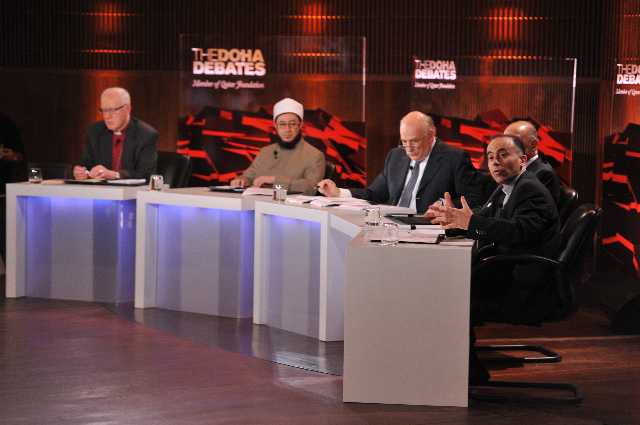
It's a situation of a civil war. That's why I'm very concerned. And it's not so easy to deal with such a situation. It is really a civil war in Syria now, I think. And again, the only thing we can do is to fight these stereotypes and to give a more political aspect of the conflict and a less religious aspect, or less communal aspect of the conflict. This is also one thing we can do, is to promote that there are Christians on both sides and Muslims on both sides and Alawis on both sides. Maybe of course there are a kind of majority on this side or on another, but it's to tell people that it's a political conflict and it's not, of course, a communal conflict. And this will ensure the possibility of living together in the future. That is a very serious situation.
TIM SEBASTIAN
Okay. In a moment we're going to go to the vote. Before we do that, I'm going to ask each of the panellists to give us just one sentence to crystallise their views and to send you off with a final message before you do vote. One sentence. Lord Carey, we'll start with you and we'll go round in a semi-circle.
GEORGE CAREY
If you vote for the motion, you're voting for change. You're voting for a hope that this historic Middle East, so rich in oil, in history, in language, can be once again a powerful place. And so you are voting for a Middle East that's going to welcome others..
TIM SEBASTIAN
One sentence.
GEORGE CAREY
... where human rights will exist. So vote for change.
TIM SEBASTIAN
About eight sentences. Can you be more economical, Ahmed Saad?
AHMED SAAD
Yes, I will. If you vote for the motion, it means you're saying Arab governments have to do something to protect their fellow citizens for the sake of honesty, justice and also protect their own countries from foreign interference. Sort out your home before someone has to sort it out for you.
TIM SEBASTIAN
Okay. Roger Bismuth. One sentence, please.
ROGER BISMUTH
If you fight against the motion, I will agree with you. But [Laughter] vote for forming action but in a positive way. Against in a positive way. [Laughs]
TIM SEBASTIAN
Do you understand that? [Laughter] Fadi Daou.
FADI DAOU
Since I am the only one now against the motion. [Laughter] So I will remind you that ‘dignity' was the key word of the Arab Spring and not ‘minority'. And this is why the new regimes are challenged now in their capacity to embrace diversity and to promote an inclusive citizenship. That's why vote against the motion.
Vote result
TIM SEBASTIAN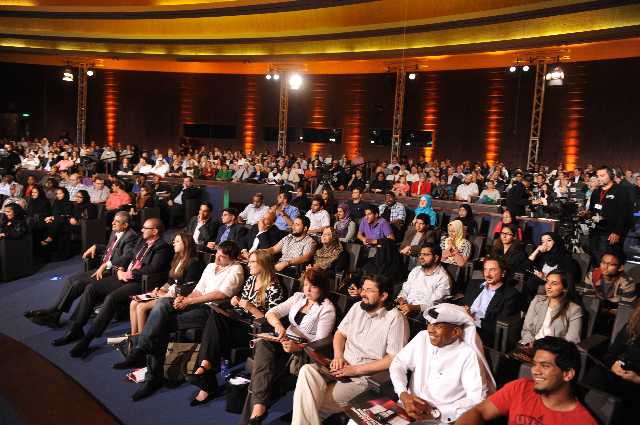
All right. Okay, thank you very much. All right. Ladies and gentlemen, we are going to vote on the motion, the much disputed motion: ‘This House believes Arab governments should take urgent measures to protect religious minorities.' Let me just explain how those voting machines work. If you want to vote for the motion - that is the side represented by those on my right - you're going to need to press button 1 in a moment. If you want to vote against the motion - the side represented by those on my left - it's button 2. Whichever button you want to press, would you please do it now. You only have to press once. We should have the result for you in just about 15 seconds.
There's the result. [Applause] That's it: 72 percent for the motion, 28 percent against. The motion has been resoundingly carried. All that it remains for me to do is to thank our distinguished speakers for coming here tonight. Thank you to you, the audience, as well for your questions. The Doha Debates will be back again next month. Till then, from all of us on the team, have a safe journey home. Good night. Thanks for coming. Good night. Good night. [Applause]
Watch online

